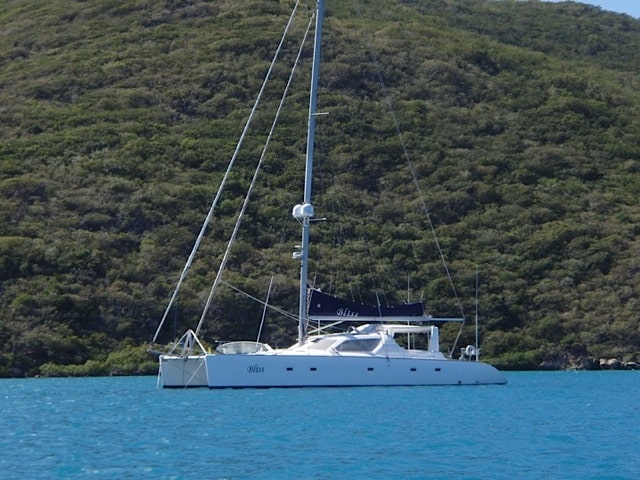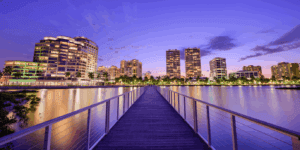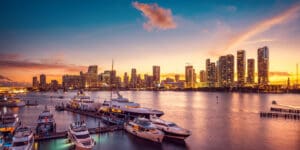Overseas Radio Network – Why Catamarans Are Cruiser Favorites & Visiting Foreign Countries
 In the Overseas Radio Network Show 2, Segment 1, Stephen and Estelle talk about:
In the Overseas Radio Network Show 2, Segment 1, Stephen and Estelle talk about:
- Favorite type of yacht for cruising
- Entering and exiting foreign countries
GARY FRETZ: Good morning, good afternoon, and good evening to all my friends around the world. This is Gary Fretz and our show is about “Yachts, the Perfect Escape Vehicle”. Why are yachts the best solution? Well, you can live aboard yachts for $15,000 or $15 million and everywhere in between. They become your home and provide inexpensive transportation around the world. With recent technological innovations, it becomes very easy for anyone to navigate anywhere and you can now have all the comforts of home on a yacht.
For a transcript of this podcast, click “read more” below.
GARY: One strategy I like is to go to the country you are thinking about moving to and live there on a yacht. It’s like “try before you buy”. Because if you find that you don’t like something about the place like your neighbor, the weather, or whatever, then it is very easy to cast off your lines and move on. In my experience, it’s the only way to go.
Mu guests today are Stephen Cockcroft and Estelle Cockcroft. They left South Africa in 1992 and have visited over 50 countries. They sailed to the Indian Ocean, the Red Sea, the Mediterranean Sea, the Atlantic Ocean, and the Caribbean. They have more adventures to talk about than we could cover in 10 show, so let’s get down to business.
Guys, what is your favorite type of yacht to cruise on and why?
Favorite Type of Yacht for Cruising
STEPHEN: Well, in the beginning we thought it was a monohull. And we ended up building our own 45 ft sailing monohull in South Africa in our back yard which we sailed for about 34,000 miles through the different oceans. And when we got to the US, my wife, Estelle, said, “Why don’t we try a catamaran because only eccentric people climb through their roof to get into their living room.” So we ended up buying a catamaran and we are certainly of the opinion that catamarans are without a doubt the best cruising boats for many, many reasons. I will let Estelle give us the reasons why.
ESTELLE: I love the catamaran just because the living space obviously is fantastic. And then of course I did get a little seasick when we were on our monohull for a while. And even after those miles probably after 30,000 miles on the monohull still never got better. But when we started sailing on our catamaran, I never experienced that seasickness, being tired because you have to hold on while you heeling. There are so many aspects to a catamaran that it’s just wonderful.
STEPHEN: One of the…I am normally the guy outside that has to do all the driving and stuff, a couple things I really like. One of them is that you put your beer down and it doesn’t fall over.
GARY: Nice!
STEPHEN: The other one, of course, is safety. You don’t have the boat heeling over so you’re walking around on a flat platform. And under power, it is extremely manoeuvrable because you have engines are far apart from each other so you don’t look silly when you trying to dock the boat. On a monohull this can’t happen when you have tide and wind in the wrong direction cats are far easier.
ESTELLE: And no rolling at anchorage. Woo hoo!
GARY: Nice. I have owned 2 catamarans also. And I am a cat-aholic as well because I think they are head and shoulders above the monohull. Maybe because you can have a large panoramic salon that’s your living room with an open country style kitchen. You can have 3 to 4 bedrooms spread wide apart so you will less cramp and more private than sharing a wall with your friends. You also have room for freezers to store your favourite food extra room for washers and dryers and everything you have in a typical 2 bedroom condo can be fit in a catamaran and this so you know this was really impossible 20 years ago.
So, let me ask you another question. I noticed that when I was cruising it seem to be very easy to check into the immigration all the countries that I visited. Didn’t you find that arriving in a foreign country on a yacht is much easier to enter and stay in most countries?
Entering and Exiting Foreign Countries
STEPHEN: Absolutely. When we left South Africa, we were on South African passports. Of course, we had a lot of problems around the word having to have visas. When you arrive on a yacht, you are essentially arriving as crew on a transient vessel and so entering countries is a lot easier. Most of the countries didn’t require that we had specific visa like what you need when you come through an airport. So it made life a lot easier for us to travel and we got relatively limited time allowance to stay in each country.
GARY: How long would they typical allow you to stay?
STEPHEN: Well, you know, some countries with 30 days, some countries with 3 months, some countries 6 months. But it is not really a big deal because if you travelling and you like a place you can sail off to the next place so you depart you make entry in the next place. If it is an island, you’re normally relatively close. And if you like it you turn around and sail right back, and then you just restart the clock.
GARY: I noticed that whenever I’d go to another county they wouldn’t ask a lot of questions and they sort of treated you like a first class tourist. And another trick that I use to use is I would say that I was a travel writer on the blank on the immigration form were they ask for your occupation. Some of the immigration officers wouldn’t look at it. But others would look at it and say, “Oh, you are a travel writer! What are you writing about?”, and they really treated me very well when the saw that.
So, the other thing that I looked up on the internet recently was the rule seemed to have changed in Europe. And I understand now that you can get an 18-month cruising permit there now. And so, if you are a non-EC registered vessel, you simply clear in and you get permission to stay there. It used to be 6 months or 1 year something like that. And all you have to do is just leave go nearby to a non-EC place like Tunisia, Cypress, or Malta, have a beer turn right back around and go back to Europe.
ESTELLE: Quite honestly, Gary, you come in there with your vessel. It’s your home. I think the officials generally think you are not going to runaway and leave your boat there so they do treat you well.
GARY: And you have an expensive asset there. So they figure you are not going to be a pirate.
ESTELLE: Right, right. Or put your roots down in the local population.
STEPHEN: I think the important thing is that they give you entry because they know that you’re probably going to move on. It is controllable situation. It is very, very easy and very friendly when you are transiting on a vessel.
GARY: Okay, we have to take a short break now and we will be right back you are listening to “Yachts, the Perfect Escape Vehicle” only on Overseas Radio Network.





